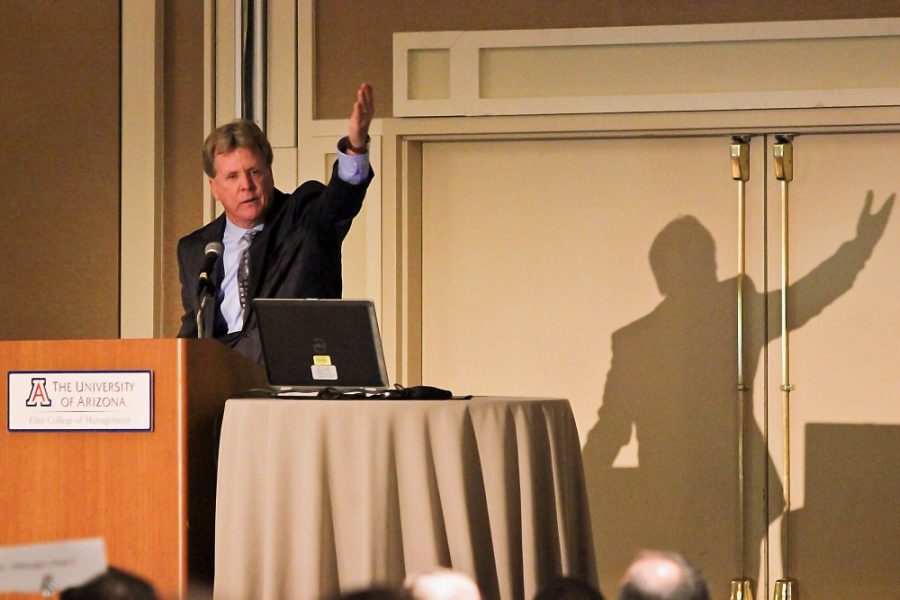Tucson added 2,400 jobs to its economy in 2013, showing a 0.7 percent increase from the previous year, said economic analysts at the annual Breakfast with the Economists conference Wednesday morning.
The annual breakfast is the Eller College of Management’s mid-year economic update. George Hammond, director of the Economic and Business Research Center, and Steven Reff, a UA economics lecturer, shared their thoughts on the Tucson economy for the 2014 year.
Several students work in the research center and have a role in the annual forecasting report, according to Len Jessup, dean of the Eller College of Management.
Hammond began his lecture on a less-than-optimistic note about the Arizona and Tucson economies. He described 2013 as an economic drag due to several factors. The 2013 government shutdown negatively impacted Tucson, Hammond said.
Tucson was especially vulnerable to the government shutdown because of the amount of government activity in this city, Hammond said. He also said that Tucson is stable because of health care jobs.
“We’re making a lot of progress in terms of driving our unemployment rate down,” Hammond said.
Hammond said the catch to the progress is a decrease in the size of the labor force. There are also two demographic transitions to consider: aging of baby boomers and transition to retirement. Hammond said there is growth in industries such as construction.
“[The Tucson economy] is a little bit faster, but not a return to the good old days,” Hammond said.
After Hammond spoke, Reff began his part of the presentation, focusing on the macroeconomics of the nation and Tucson. Reff began by talking about the importance of two words in relation to the economy: it depends. He used these words throughout his presentation to answer hypothetical questions about the Tucson economy.
The economy was beyond ideal during Clinton’s presidency and the current national economy is approaching a near ideal state, Reff said. A beyond ideal economy has an increase in the order of durable goods, increased industry and increased money supply, according to Reff.
For the Arizona economy, the severe weather patterns in Southern states could be a good thing in the years to come because retired individuals will relocate to Arizona for consistent warmer weather, Reff said.
Tucson has some challenges to face, Reff said. The city needs to address its water crisis and getting water to Tucson for a lower amount of money.
He also thinks the number of homeless people in Tucson is another challenge for developing the city. Reff said he was concerned about the Tucson economy and how businesses looking to relocate view the city of Tucson.
“In the last five years, Tucson has become better in downtown development,” Reff said.
He said it is important to keep the city clean and shared a story of how he and his students cleaned Speedway Boulevard from the Interstate 10 to the UA. He encouraged guests at the lecture to pick an intersection in Tucson to clean.
“Let’s sweep our porch and make this the greatest community in the United States,” Reff said.









